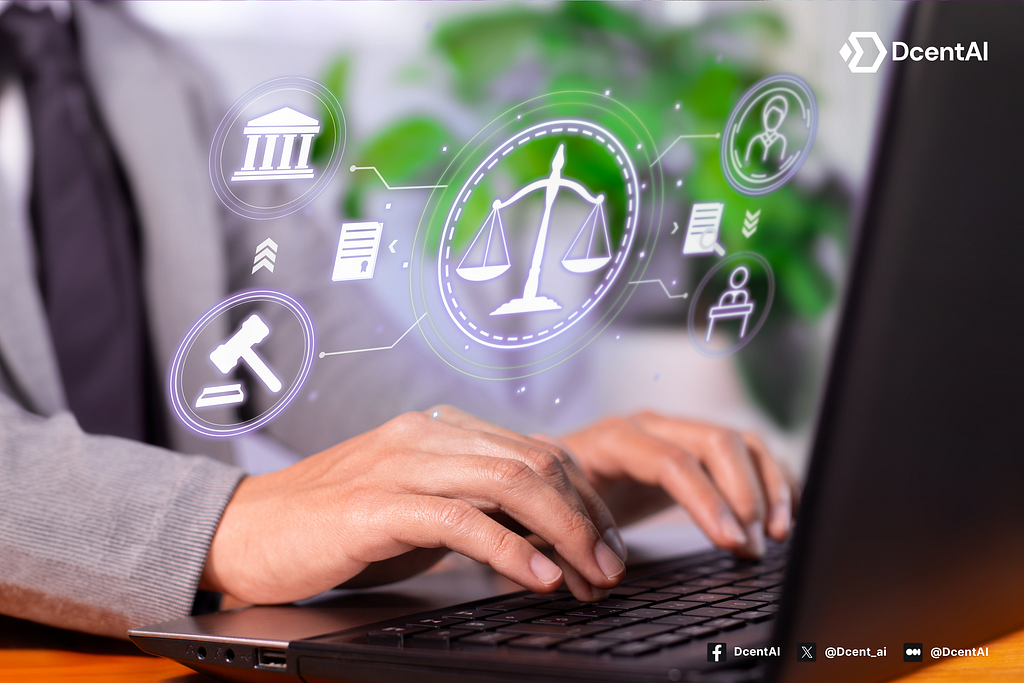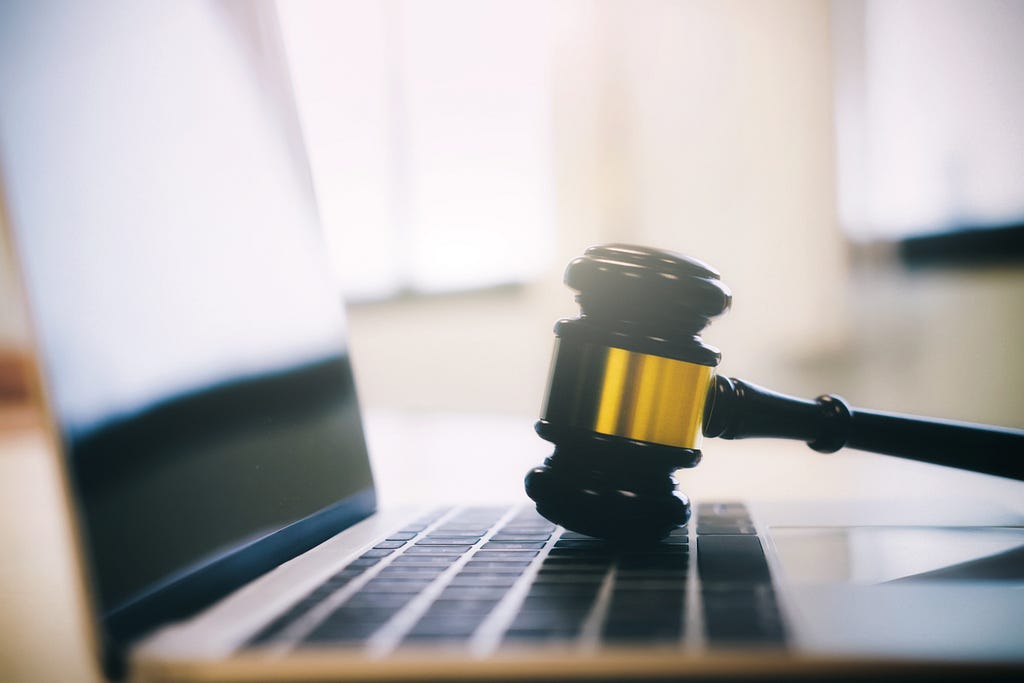Decentralized AI in Legal Technology: Streamlining Processes

Integrating legal technology has progressively proven essential in optimizing the legal industry, improving efficiency, and decreasing the costs and duration associated with legal processes. This progression is significantly backed by artificial intelligence (AI), which automates routine tasks, processes tremendous sums of legal data, and provides quick insights to help legal professionals make informed decisions. Decentralized AI is getting a potent remedy as the need for further dependable, adaptable, and secure AI infrastructures increases.
By distributing information processing among several nodes, decentralized artificial intelligence( AI) lowers the possibility of single points of failure and improves data protection. This development can transform legal innovation entirely by guaranteeing solid security protocols, adding accuracy, and optimizing workflows.
DcentAI, a pioneer in decentralized AI networks, drives this change by delivering solutions that empower legal professionals to oversee complicated tasks with superior efficiency while maintaining the topmost security and reliability standards.Become a pioneer of DcentAI community!Challenges in Implementing Decentralized AI in Legal Technology
Here are some of the challenges in implementing decentralized AI in legal technology:
Integration with Existing Legal SystemsIntegrating decentralized AI into existing legal systems is a significant challenge due to the reliance on established, centralized software and databases. Transitioning to a decentralized model requires complex technical adjustments, data migration, and retraining of legal professionals, making the process resource-intensive. DcentAI mitigates this legal challenge by offering customizable, flexible solutions that work alongside existing platforms, minimizing the need for extensive reconfigurations. Their robust migration tools and training support ensure a smoother transition, reducing complexity disruption and maintaining continuity in legal operations.
Data Privacy and Security ConcernsDecentralized artificial intelligence (AI) improves security by lowering the possibility of centralized hacks. Still, it also brings new difficulties, like securing every network node to stop illegal access and data manipulation. Ensuring consistent security across all nodes can be challenging in the legal profession since data sensitivity is crucial, which could result in vulnerabilities. Advanced encryption, robust access controls, and continuous monitoring are essential to maintain data integrity in a decentralized system.
DcentAI addresses these security challenges by implementing advanced encryption techniques and strong access controls across its network. Each node is fortified to prevent unauthorized access and protect sensitive legal data. DcentAI reduces the possibility of large-scale breaches by spreading data among several nodes and ensuring that no single node has all the data. With its ongoing monitoring and real-time threat detection, the highest data privacy and protection standards are met in a safe environment.
Ensuring Data Consistency and SynchronizationAnother major problem is keeping data synchronization and consistency over a decentralized AI network. Differences in data between nodes might result in inconsistent legal outcomes or mistakes in case management, which is problematic in legal technology, where accuracy and current information are essential. It is challenging to guarantee that every node has real-time synchronized and consistent information, necessitating complex data management methods. Reaching this degree of alignment is necessary to deliver trustworthy legal services and steer clear of any legal disputes that can arise from inconsistent data.
By implementing robust data management methods, DcentAI lessens the difficulty of preserving data consistency and synchronization over a decentralized network. These protocols guarantee constant synchronization between all network nodes, delivering real-time updates and maintaining data accuracy throughout the system. DcentAI’s technology is designed to handle the complexities of legal data, ensuring that all information is up-to-date and consistent, which is critical for accurate and reliable legal outcomes. The platform’s robust synchronization capabilities help avoid data discrepancies that could lead to errors in legal processes.
Scalability and Performance ManagementAs legal cases and workloads increase, the decentralized AI network must scale efficiently to handle the additional demand. Managing many nodes while ensuring consistent performance and responsiveness can become increasingly complex. Legal technology systems must balance resource allocation, processing power, and network coordination to maintain high service levels as the system expands. This challenge is particularly pronounced in large legal firms or institutions that handle extensive caseloads and require systems that scale dynamically without sacrificing performance.
DcentAI’s network is inherently scalable, allowing legal firms to expand their AI capabilities as needed efficiently. The platform supports the addition of new nodes without compromising performance, ensuring that the system can handle increased workloads as the demand for legal services grows. DcentAI’s decentralized infrastructure is designed to balance resource allocation and processing power dynamically, maintaining high service levels even during peak times. This scalability is particularly beneficial for large legal institutions that require reliable performance across expanding operations.
Compliance with Legal and Regulatory StandardsUsing decentralized AI in legal technology presents additional difficulties in adhering to legal and regulatory requirements. Data processing, storage, and privacy regulations vary throughout jurisdictions, making the cross-border deployment of decentralized systems challenging. Careful planning and coordination are necessary to ensure a decentralized AI network complies with all applicable legal norms, particularly when handling cross-jurisdictional legal disputes. The decentralized structure of the system might also make it more challenging to audit and confirm compliance, which would still add another level of difficulty to the deployment process.
DcentAI offers solutions that guarantee decentralized AI networks follow national and international standards. These solutions help users navigate the complicated legal and regulatory compliance world, enabling legal institutions to adopt decentralized AI confidently while meeting all legal obligations.
Real-World Examples of Successful implementations of AI in legal technology
Here are some real-world examples of successful implementation of AI in legal technology:
Contract Analysis and Management by JPMorgan ChaseJPMorgan Chase has effectively adopted an Artificial intelligence-powered platform known as COIN( Contract Intelligence) to optimize the examination of legal contracts. Previously, reviewing and interpreting complicated legal papers required attorneys to work over 360,000 hours a year. COIN employs machine learning algorithms to accomplish this. JPMorgan can analyze these contracts more quickly and precisely with AI, reducing error rates and freeing legal staff time for more strategic work.
Legal Research with ROSS IntelligenceROSS Intelligence, an AI-powered legal research platform, has been widely adopted by law firms to improve the efficiency of legal research. Using natural language processing (NLP), ROSS can understand and respond to complex legal queries, providing relevant case law, statutes, and legal opinions in seconds. This AI tool helps lawyers conduct faster, more comprehensive research, reducing the time spent on this task by up to 30%, which allows them to focus more on case strategy and client service.
Predictive Analytics in Legal Outcomes by Lex MachinaLex Machina, a subsidiary of LexisNexis, uses AI to provide predictive analytics for legal outcomes. This tool analyzes past court cases, judges’ rulings, and legal strategies to predict the likely outcome of ongoing cases. Law firms and corporate legal departments use Lex Machina to refine their litigation strategies, assess the risks of going to trial, and decide on settlement options. By leveraging AI, users gain a data-driven edge in legal decision-making, increasing their chances of success.
AI-Powered Document Review by Kira SystemsAn artificial intelligence( AI) tool created by Kira Systems helps with document analysis during due diligence, especially for mergers and acquisitions( M&A). The AI software takes a fraction of the time compared to human lawyers to detect, extract, and estimate important clauses and provisions from thousands of legal papers. Kira Systems helps commercial legal brigades and law firms save time and money by automating this laborious process, refining the completeness and accuracy of document assessments.
Litigation Strategy and Case Management by CaseTextCaseText is a legal research and case operation tool driven by artificial intelligence that assists lawyers in creating litigation strategies. CoCouncel analyzes briefs using cutting-edge machine learning to find material case law that could have gone unnoticed. Preparing for a case guarantees that attorneys have access to all applicable material, refining the quality of their arguments and raising the possibility that their clients will receive good outcomes.
Automated Compliance Monitoring by Compliance.aiCompliance.ai utilizes AI to assist legal and compliance groups stay current on regulatory changes. The software monitors and analyzes regulatory filings, highlighting changes that might influence a business’s operations. Compliance.ai automates this process to guarantee that businesses remain updated with rules, lowering the possibility of fines and freeing compliance staff to work on higher-value tasks.
Final ThoughtsDecentralized AI will transform legal technology by optimizing processes, upholding data security, and enhancing overall efficiency within the legal sector. As legal practitioners slowly depend on AI to handle intricate tasks, the decentralized model presents a scalable, flexible, and secure alternative to conventional centralized systems.
By distributing data and computational resources across various nodes, decentralized AI mitigates the threat of single points of failure, guarantees data integrity, and upholds strict security measures.
With pioneering solutions similar to DcentAI at the forefront, the adoption of decentralized AI in legal technology is anticipated to transform the delivery of legal services, rendering them more effective, secure, and responsive to the industry’s dynamic demands.Become a pioneer of DcentAI community!To learn more about DcentAI, visit our Facebook and X accounts.Decentralized AI in Legal Technology: Streamlining Processes was originally published in Coinmonks on Medium, where people are continuing the conversation by highlighting and responding to this story.
